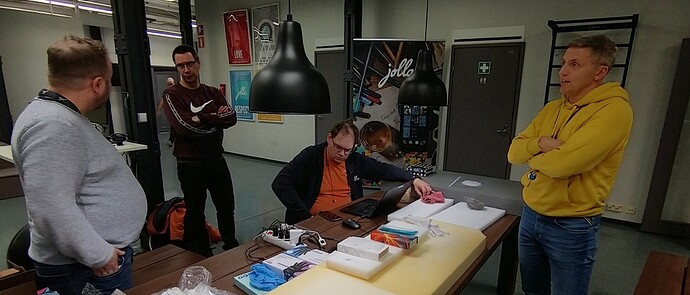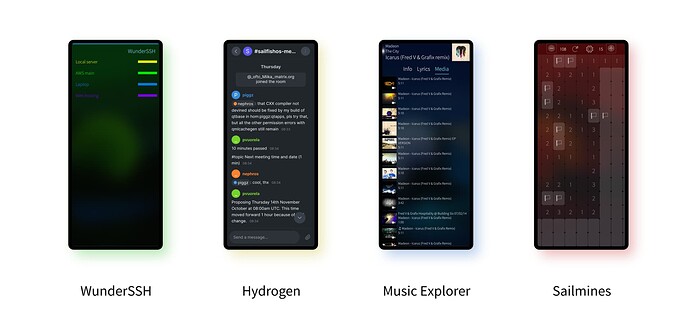Sailfish OS update from Jolla
There has been reported cases that a C2 device is received with an empty (or almost empty) battery which may cause device to go to an unbootable state. Also, there has been cases where the touch screen is not functioning.
Thus, we have now paused all new C2 shipments and are looking to make a new SW release which we will reflash to the remaining units waiting to be shipped.
Meanwhile, we thank you all for your patience and help to overcome these unexpected hurdles. For those who have faced such issues, we apologize for the inconvenience, and please be assured that we’re doing our utmost best to help you thru our usual channels like Zendesk and also extra measures like Tampere & Helsinki C2 support days and C2 support day at Berlin.
On Tuesday we had a good support day at Tampere office. Today we have C2 support day at Helsinki from 5:30 PM - 7:00 PM @ Merimiehenkatu 36 D, 2nd floor – there will be a Jolla rollup helping you find the right door. Next week Thursday we have a C2 support day at Berlin – big thanks for @explit for your help in organizing. If you’re planning to join Berlin event, please let @explit to know asap. Finally, @abranson can provide support but timing and venue is open.
Of course, we also have usual repository roundup from Damien (dcaliste) and app roundup by David (flypig).
Repository roundup
The team has been busy with fixing issues during the period. Some annoying bugs reported in the Forum have now been solved, like issues in Fingerterm caused by the large rounded corners of the C2 device, or the pulley menu hanging when the sound daemon is not responding. There is also a commit to prevent the user to enter a too short device lock code.
Network and telephony stack
connman, the connection manager, Laakkonenjussi added support for dual IPv4 and IPv6 with VPNs, currently supported only with WireGuard VPN.
Native browser
embedlite-components, QML components for the browser, pvuorela fixed some JavaScript errors reportinglogas undefined.
Main interface
-
mce, a framework exposing hardware status of display, buttons…, spiiroin added led pattern as a feedback to user, this is mainly used by Jolla Mind2. In case the led pattern is handle by software, a battery limit can be set to avoid to high drain. -
nemo-qml-plugin-devicelock, QML bindings for device lock access, pvuorela added sanity checks on device lock code length. So too short device lock codes cannot be saved. -
libngf-qt, QML bindings for the non graphical feedback daemon, pvuorela proposed to fix a D-Bus blocking call making pull down menu to hang and timeout whenngfddaemon is not responding.
Low level libraries
-
usb-moded, the USB tracking daemon, ifusb-modedis started when there is no usb cable connected, the initial transition to disconnected state is left hanging in transient “busy” state. spiiroin fixed this inconsistency by immediately ending this transitional “busy” state. -
poppler, the PDF rendering library, nephros compiled and packaged the private headers so they can be used in Chum by packages requiring them. -
libxml2, an XML parsing library, pvuorela updated it to 2.13.4. mal added a fallback ifgetentropy()is not supported. -
cryptsetup, a utility for setting up encrypted disks, pvuorela worked on an upgrade to 2.7.5.
Developer’s corner
-
scratchbox2, the cross-compilation tool used by the SDK, Thaodan fixed the declaration of STATX function and included some missing headers. -
sp-rich-core, a tool to create core with many information, keto set the core pipe limit to prevent kernel from clearing the process info from/proc/<pid>before the handler has finished. -
fingerterm, the console application, pvuorela fixed margins when used on devices with large rounded corners and also fixed an issue in text selection for such devices also. -
valgrind, a tool for finding memory management bugs in programs, pvuorela updated it to 3.24.0.
App roundup
We have quite a mixture of apps for this fortnight’s newsletter. As is so common when it comes to apps, especially those that find their way onto our phones, there’s a common theme of communication. Whether it’s computer communication, social communication or communication through the medium of song, we’re really all just trying to make connections.
So let’s start at the technical end. WunderSSH is a new app from Wunder Wungiel (WunderWungiel), with version 0.2 having been only just released a couple of weeks back. As the name suggests, WunderSSH is a great tool for anyone who wants to connect with remote computers via SSH. I must admit, I probably spend far too much time tapping commands into the consoles of remote computers. I remember, many years ago, when I first realised the power of being able to SSH from my Sailfish OS phone to a remote server. It all feels quite natural now, but back then it felt like a game changer.
WunderSSH will make the experience of doing this even simpler. Its primary function is to act as a set of bookmarks for connecting to all of your various remote computers. The obvious parameters — hostname and username — are entered easily alongside the name you want to give the bookmark. Selecting it from the main page then fires up the Terminal application for you to continue with your SSHing.
It’s good to see Wunder hasn’t fallen into the trap of trying to develop a bespoke SSH client. Having an app that launches the terminal is the better way to go, in my opinion.
Nevertheless, as a human it can be hard to remember not just usernames and servers, but also the strange command line parameters and incantations that go with. WunderSSH lets you set all of this info up in advance so you don’t have to remember it yourself.
The app will automatically log in with an SSH certificate if you’ve set one up, but you can also enter a password for it to store on your behalf as well if that’s your preference.
Overall, it’s a pretty simple app that focuses on what it wants to achieve and tackles it well. Similar functionality could potentially be achieved using an app like ShellEx, but having a dedicated app for SSH alone could well make sense for many users.
The one area where it won’t help is in connecting from laptop to phone, something I find myself doing all the time. But as long as your connection is heading outbound, WunderSSH makes for an excellent companion. The first and latest release of WunderSSH is available from OpenRepos
If it’s not computers, but rather other humans, you’re trying to connect with, you may find Hydrogen from Thilo Kogge (thigg) is more your bag. Hydrogen is a Matrix client, which means that it’s a messaging app, but arguably with a philosophy that’s closer to Slack than WhatsApp. This makes it especially helpful for group chat.
There’s no shortage of messaging platforms to choose from. Matrix stands out due to its secure, federated and open source approach. But Matrix is the platform, not the app. There are a huge number of clients available for accessing Matrix. Even just on Sailfish OS there are at least to choose from. Hydrogen stands out as being a WebView-based implementation.
There are advantages and disadvantages to this. The main disadvantage is that the app isn’t developed using the standard Sailfish user interface components. This means it can look a little out-of-place on a Sailfish phone. But thigg and the other developers have put in considerable effort to make it integrate as seamlessly as possible. For example it supports native notifications, scaling and ambience matching, all controlled from a Sailfish-specific configuration page accessible via a classic Sailfish-style pull-down menu. I also can’t get enough of the new “fun facts” shown during start up.
If that’s the main disadvantage then the main advantage is that Sailfish OS can benefit from the upstream development of a Matrix client used across multiple platforms. That means it has good support for encryption, rooms, avatars and much more. It really is full-featured and works extremely well. As a mobile-first client, it never feels bloated despite the breadth of features. It’s designed for — and works great on — the limited real-estate of a mobile phone screen.
If you’re using Matrix for communication then I can’t recommend Hydrogen highly enough. It’s a first-class matrix client. Although technically available on the Jolla Store and OpenRepos, it seems that the latest versions are only available from Chum. The app has been developing rapidly recently as the commit history clearly shows, with improvements to security, notifications, user interface and more. So it’s worth getting the latest version.
Next up we have analogue communication in the form of Music Explorer from anarchy_in_the_uk. In practice, it looks like recent development of the app has been taken over by App Roundup veteran Mark Washeim (poetaster). I was surprised to discover we’ve not covered the app before in the newsletter as it offers an impressive array of features for music lovers.
The main page shows blocks of random tracks, but enter a search term and it’ll spring to life, taking you to something more specific. Enter an artist and the app will allow you to drill down: first album, then track, then different performances and finally multiple versions of the same track: official mix, live performances, remixes; that kind of thing.
At each stage you’re offered a surprising breadth of information. Album details, including release year, publishing label and the ability to pull out related artwork. Individual tracks offer similar info, often with the addition of full lyric listings as well. Impressive.
Then finally the individual media for the track can be pulled from YouTube. Click and hold a media item and you’re given the option to capture a URL for loading the YouTube page in the browser. Or you can download the track to play in the app, something you should only do, of course, if you’re satisfied you have the rights from a copyright perspective, which may well not be the case of course.
Given this wealth of data I was expecting to feel lost while navigating around the app, but in practice it takes just a short while to get familiar with the two-tier interface. Swiping along the top controls movement between the top-level pages, below which you’ll typically see three tabs that can also be swiped between.
The title of the app is no accident. In my testing I concluded it wasn’t the best music player out there. If you have your music stored locally there are better options available. There are also some great lyric and YouTube viewing apps out there. But if you want all these combined into a single app with a focus on exploration, then this is a great way to fulfil your needs.
Version 0.46 of the app improves media downloading, which overall I found to be consistently good. The app is available from both OpenRepos and Chum.
Finally for the roundup this fortnight if you’re trying to avoid communication entirely, what better way than to engross yourself in a single-player game of mental dexterity. Sailmines from Ash Sharkey (Sharks) may be just the thing. The game offers the classic Minesweeper game in all its glory. The rules are simple: you’re presented with a grid and you, as the minesweeper, have to identify where on the grid mines are hidden and where it’s safe to tread. Selecting a square displays a number representing how many of the eight adjacent squares contain a mine.
If you’re unlucky enough to tread on a mine your game is over. If you’re lucky enough to stand on a square with no adjacent mines, the area will be flood-filled up to the edges made of squares that are mine-adjacent, exposing the all-important numbers beneath.
To win the game, place flags on all the squares with mines. The crucial requirement is not to discover the mines by treading on them, but rather derived from the numbers uncovered on the adjacent squares.
It’s honestly much easier to play than to describe. The Sailmines version is a nice Silica-native implementation. The grid is large and easy to navigate, allowing zooming in and out using the plus and minus buttons on the toolbar. Tap to stand on a square, press-and-hold to place a flag. Simple, but effective.
Given the hours I’ve lost to playing this game over the years I don’t need any convincing that this is a nice addition to the Sailfish OS ecosystem, But more importantly, it’s great to see a native implementation, with all of the consistency and smoothness that brings.
Version 0.3 of Sailmines is available from OpenRepos. While I didn’t hit any bugs while playing the game, Sharks has nevertheless committed to continuing its development, which is always great to see.
I hope you’ll agree it’s another great collection of apps today. We all have our different approaches to communication and we should celebrate the diversity of ways our phones can help with this. And as always, it’s the Sailfish developers who are making this all happen.
Please feed us your news
As always, please do not hesitate to share your ideas, thoughts, or suggestion for future newsletter topics.
Hope you enjoyed reading this one!
Welcome to join us at our community meetings on IRC, Matrix and Telegram. Next community meeting will be on the 14th November. Let’s keep on working together!



 The openrepos version has some download fixes at version 0.48. I’m building that on github and chum, now, but if you’re in a hurry, openrepos is ahead of chum at the moment. EDIT: github version is up-to-date and 0.48 is in chum testing should appear in chum soon.
The openrepos version has some download fixes at version 0.48. I’m building that on github and chum, now, but if you’re in a hurry, openrepos is ahead of chum at the moment. EDIT: github version is up-to-date and 0.48 is in chum testing should appear in chum soon.